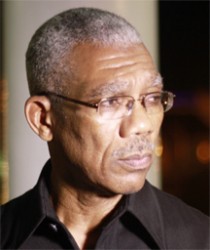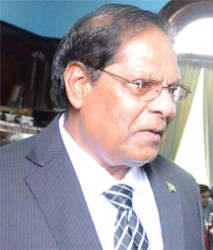The parliamentary opposition APNU and the AFC yesterday defended their decision to withhold support for the government amendment and motion billed as crucial for the Amaila Falls Hydropower Project, saying the Donald Ramotar administration failed to address major doubts about the project’s viability and offer clear support for the re-tabled local government reform bills.
The main opposition APNU yesterday drew parallels between the proposed US$840 million Amaila hydro project and the troubled Skeldon sugar factory and warned that the country cannot support another bungled venture. And the coalition also said discussions that it had with officials of the Inter-American Development Bank (IDB) revealed that tariffs may not go down as a result of the project.
APNU and the AFC on Thursday voted down the Hydro Electric Power (Amendment) Bill 2013 and a motion to increase

the debt ceiling of the country to facilitate the power purchase agreement between Guyana Power and Light (GPL) and Amaila.
Leader of the Opposition David Granger detailed the last minute efforts to save the Bill on Thursday. “We spent about two hours yesterday negotiating [in a bid] to save the Amaila project. We spent time in the Speaker’s office… the Speaker himself tried to move between the two sides and we did everything possible on our side to ensure that the Amaila project could be saved in the interest of Guyanese nation. We were concerned with the public good but the position that the Government took was not one that we could support,” said Granger at a press conference held at his Hadfield Street Office yesterday.
“What happened last night was an attempt to blackmail the opposition into taking a decision about a false deadline. Nothing will happen on July 18 that will damage the entire hydro scheme. There needed to be some more assurances to ensure Amaila does not become another Skeldon,” said Granger.
“If Amaila collapses, if Amaila is badly-handled and badly-managed, it would do severe damage to the national economy and [so] we are not going to be pressed into bogus deadlines,” he said.
However, Granger acknowledged that there needs to be a good hydro project in Guyana, one which brings costs down, brings a greater amount of electricity and one which is properly managed and would not leave the country with an incapacitated power sector.
Granger said that the discussions that took place on Thursday night should be set within a holistic framework. “We shouldn’t try to separate the hydro power reforms or attempt to introduce a measure to increase the loan ceiling separate and distinct from what was happening,” he said.
“We started off with a motion to discuss or debate the local government bills. In addition to that we have been discussing other governance issues with the administration and we did not feel that government itself was making any movement towards resolving any of the other governance issues that we raised with them. The matter of the hydropower alone is a subject that had been discussed with the IDB. We were aware of what was taking place. We had sought information, did reconnaissance flights over the area, and received documents. The IDB itself is conducting a due diligence study,” he said.
A no go
At a separate AFC press conference, the party’s Vice-Chairman Moses Nagamootoo also accused the government of trying to “blackmail” the opposition into supporting its agenda, while adding that his party firmly believes that there was a deliberate move to “stalemate” any possible cooperation.
He suggested that the government wanted to use the opposition as a scapegoat in the event that there was a shutdown of the Amaila Falls project.
He said that the AFC voiced support for the Hydro Electric Power (Amendment) Bill, to create the environmental offsets for any hydro project, not only Amaila.

At the same time, he noted that the AFC took a principled position that it would support the debt motion once the IDB gives the project the green light. “This remains our position … that the project is deemed feasible,” he said
Nagamootoo said that his party had no issue with the amendment that was presented but added that it needs disclosures from the IDB about the direction of the feasibility study. He added that in terms of GPL, the AFC also needs more answers, including the assurances that the company can deal with commercial losses. “It is a no go at this point in time until we have more guarantees and assurances,” he added.
With the government’s decision to delay the second reading of the four local government bills that were returned to the Assembly after a parliamentary select committee review, Nagamootoo said the AFC believes that the government is not interested in elections. He stressed that all his party wanted was a commitment to the holding of local government elections through the support for the bills and the guaranteed that the president will assent to them.
No doubt’
Meanwhile, APNU MP Carl Greenidge also said that the coalition did not have a problem with what the Hydro-Electric Power (Amendment) Bill was meant to achieve – the biodiversity offset area as required for a project such as Amaila.
“While it is true that we have been having discussions over the last day over a variety of things including the hydro, at no point [were] the specific amendments – which appeared yesterday only – …provided to us by the government,” he said. “In addition to the four-page Bill, you now had an amendment which is larger than the Bill itself. It is really not normal to appear in the Parliament and to have to take a decision of that nature on the spot,” he said. He added that if the government required such amendments to be passed, then it should have ensured it consulted with the opposition parties well in advance of yesterday’s sitting.
“If the government is trying to sell to the people the need to have a project that is as large as this, you would have thought that they would be scrupulous in selling the case so that there is no doubt. A big part of the problem with Amaila has to do with irregularities. The project started off as an irregularity,” he said.
Greenidge said that by the year 2020 to 2025, the demand for power in Guyana would be in excess of 200 megawatts. “You are now putting in place a project that will only deliver at a maximum 165 megawatts and for most of the time the amount of power generated will be less than the rated capacity owing to the rise and fall of the water level,” he said. “The amount that you are guaranteed is 105 megawatts,” he said.
“As regards to the question of whether the opposition is prepared to accept any specific Bills, the regulations, the Standing Orders of the House don’t allow those Bills to be submitted before the recess. We have said nothing that would give the impression that we are not prepared to consider the Bills,” he said.
“If you are investing in the project as huge as the hydro, certainly larger than the GDP of the country, and the hydro operates the same way as Skeldon, you’re going to have heavy additional taxes to pay and you’re still not going to have reliable or affordable electricity,” he said.
According to Greenidge, at a recent meeting IDB officials were not prepared to commit to a tariff rate lower than current rates GPL charges for electricity. “They said that they cannot guarantee that the electricity rates will be less than they currently are,” he said.
He explained that if the project works as it should, then it would generate affordable electricity and the productive entities will be able to produce and export and employ and pay taxes in a manner that would enable us to service the debt, “so the ceiling is the least of our problems.”
Greenidge said that according to information received, Sithe Global, the developer of the hydro project, requires a return on investment in the neighbourhood of between 18 and 19 percent. “Who gets that sort of return on capital today?” he asked.
He said that when the package was first put forward for Amaila, the expected savings on tariffs was about 25 percent. However, he said that this was when the project was estimated to cost US$345 million to build. “It is now at US$840 million. The tariff is therefore not going to be the same as envisaged in 2009 when the government signed an agreement with Synergy Holdings Inc., a company that never built a toy tank, let alone a hydro dam,” Greenidge said. “Immediately the company subcontracted illegally to another entity,” he said. He said that government as a partner in the project has an obligation to disclose to the opposition the details of the project.
“At the end of the exercise, we may find ourselves with a project that delivers in a way Skeldon delivers; that is, badly,” he said. “We have an obligation to the electorate and to taxpayers. When we embrace a project that the government brings to us, we must be able to stand and defend it, and if there are mistakes we have to take responsibility for that as well,” said Greenidge. “We are not going to knowingly sign and support something with a government that happily fabricates things,” he said.





